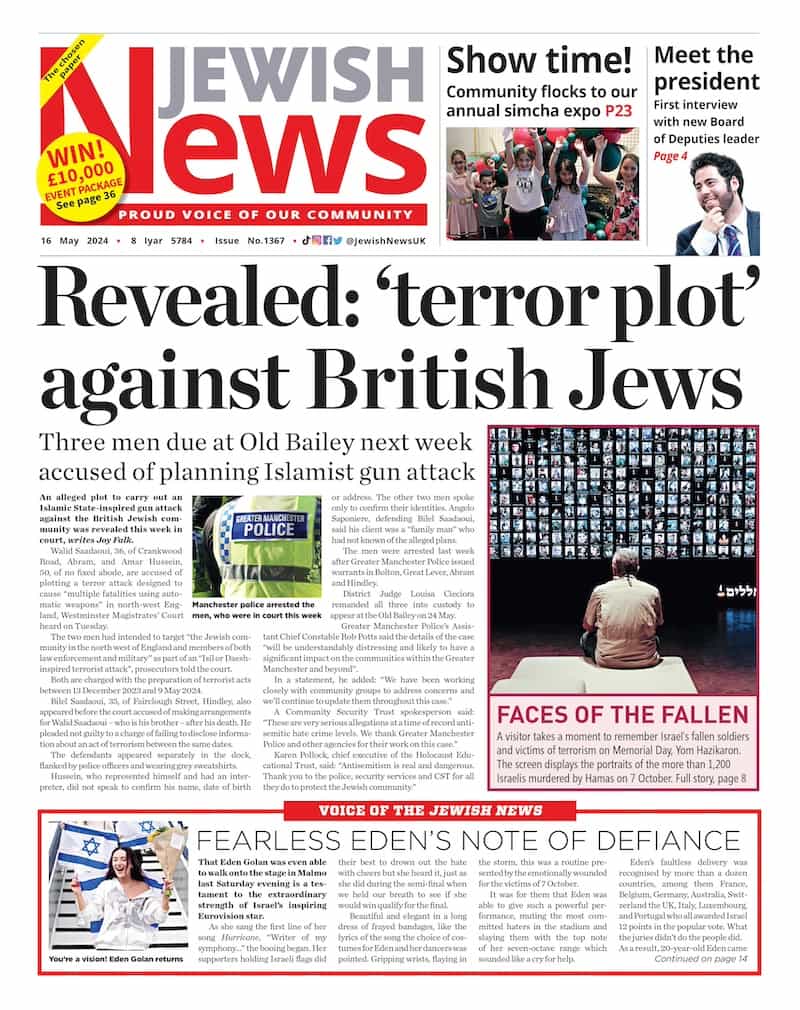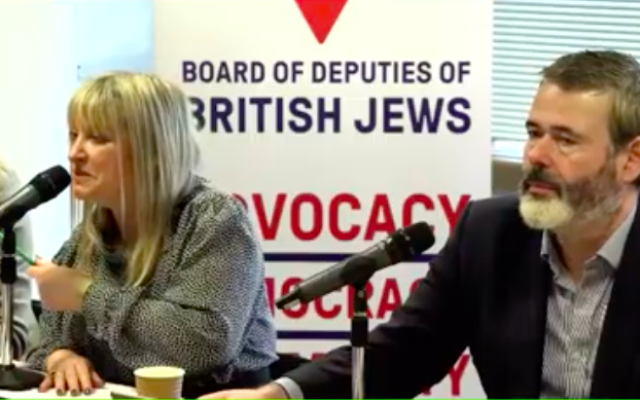Board election candidates quizzed as median age of deputies is revealed to be 65
A group of younger deputies, and those currently offered under 35s observer status, have questioned all Board election candidates on issues, including Israel, racism, and refugees
Lee Harpin is the Jewish News's political editor
Leadership candidates for the forthcoming Board of Deputies election have been questioned over a series of pressing issues – including the fact that the median age of elected representatives at the communal organisation is 65.
In a revealing exercise, ahead of the election of a new Board president, vice-presidents, and of a new treasurer, a group of deputies including observers in the under-35 age group, submitted a series of questions to candidates.
There was concern that issues such as the under representation of younger Jews on the Board, and questions around policy towards Israel and on issues such as racism deserved further focus.
Another important issue raised by the group was a concern that when engaging on issues related to Israel, the Board on occasions risked blurring “the lines in the eyes of the public between British Jews and the Israeli government.”
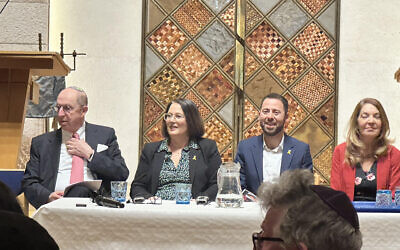
Pressed firstly over clear evidence that younger Jews were seriously under-represented at the Board, where many under-35s “are not full participants and have no voting rights as ‘observers'”, all four presidential candidates agreed more needed to be done to increase engagement.
Sheila Gewolb called for the “observer status” to be “re-examined by the new leadership” as it clearly left some of those impacted feeling as though they were not fully involved with the Board, and more likely to step away as their career and family became more important.
Amanda Bowman also suggested that if she were to become successor to current president Marie van der Zyl, she would put forward a constitutional amendment to “replace the Under 35 Observer scheme.”
She said she would propose a new under 35 deputy scheme “that will provide more democratic engagement of young deputies” and all Board members will have the right to elect or appoint one under 35s at no extra cost.
Michael Ziff said he would include young deputies within a COBRA crisis team of deputies, which would include younger representatives, to respond to emergencies, and also to the media to “best present the community’s position.”
Phil Rosenberg noted that if elected he would become the Board’s youngest ever president if elected, at the age of 38. He said he would “review the effectiveness” of the under 35 observer programme, while also reinstate the Community Engagement Officer position, previously held effectively by Lauren Kelles.
Amongst the vice-presidential candidates, Andrew Gilbert said directly:”Under 35 observers should be given the vote and be deputies” adding they should also have places on the Board’s various divisions.
Jeremy Michaelson suggested under 35s were currently treated as a homogenous group when “the needs and aspirations of those in their late teens and early 20s are quite different.”
He suggested being an observer was “part of the learning process” and called for the creation of an under 35s assembly.
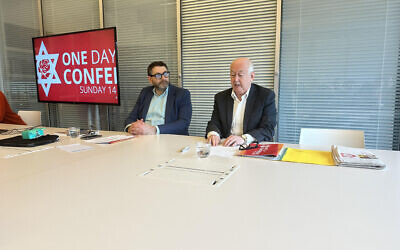
Adrian Cohen agreed there was a need to encourage younger people to become deputies, and that while the observer status was an attempt to address the lack of young people involved the “two tier system is uncomfortable and possibly entrenches the system.”
He backed a review into the problem of engagement with the Board, also with the 35-50 year-old bracket.
Owen Power said ensuring young people were engaged with the Board was an “inclusion issue” and that there was a need for Deputies to listen to the younger generations and understand their concerns.
He said young people should also receive training on understanding how the Board works and on what opportunities “are available to them.”
Denise Lester said she agreed that if “the median age is 65, the Board needs to be relevant and representative of all generations” in order to maintain the communal organisation and to “secure its future.”
She called for the introduction of mechanisms that would enable under 35s to become deputies “as soon as possible.”
A question on Israel noted the past three years had been “politically challenging for those in Israel and the diaspora” , and that there was a need to ensure the Board’s stance in favour of a two-state solution was consistent.

Significantly, candidates were asked how they would “ensure the Board’s activity does not blur the lines in the eyes of the public between British Jews and the Israeli government?”
Gewalb said she backed the Board’s two-state solution policy, but added this should not “preclude ongoing debate” and that there are “many differing views.
She claimed:”The actions of the Israeli government should be for the people who vote for the Israeli government to decide” and that “the only thing the Board should be concerned about is when these actions affect Jews in this country.”
Bowman said that the Board must “clearly articulate” it represents British Jews “and not the Israeli government” and that the interests and concerns of those in this country “may not always align” with the government in Israel.
But she added the Board “will always express support for Israel’s right to exist and defend itself.” On the two-state solution, Bowman stressed her work on the Defence Division meeting with parliamentarians and ambassadors.
Ziff said there must be a democratic means to ensure that all voices and views on Israel must be heard with “our wonderful community.” He added:”British Jewry is certainly not the Israeli government” but that he “firmly believes we must remain proud and connected to Israel, especially in these difficult times.”
Rosenberg said the pursuit of peace in the Middle East is “core to my very being.” He said if elected president “all my conversations with Israeli, Arab and other key interlocutors” will be “aimed at pushing forward peace and security in the region along the model of the two-state solution, whilst seeking to expand and deepen the Abraham Accords.”
He also said he would seek to “focus and drive forward” on policy around “releasing the hostages, taking on Iran and its proxies and expanding the Abraham Accords.”

Amongst the vice-residents, Gilbert said:”Jews in the diaspora do not have a vote, but we have a voice and we should use it.” He called for a widening of organisations the Board works with in Israel and added:”The Board must never be the mouthpiece of the Israeli embassy.”
Michaelson said that while the Board’s first priority should be the community in this country “the land of Israel is central to the Jewish faith” and that the rise of antisemitism in recent months showed that “like it or not” Jews would be associated with the state.
He added that British Jews must “take into account” that they “have not put their lives on the line for the state of Israel.”
Cohen said the Board must represent the “broad swathe of Jewish communal opinion” while adding the two state solution “at least as an aspiration” is the policy of all mainstream political parties in the UK.
But Cohen also noted that support for two-states had “waned in recent years” in Israel although “few are prepared to articulate what the alternative is.”
He added that the Board should articulate the community’s support for Israel, but that “doesn’t mean supporting every action” of its government, and nor does it mean criticising every action.
“The Board should operate on the basis of a broad consensus,” he added.
Power said the Board created difficulties for itself when “differing views” on Israel are “misunderstood and ignored.” He called for the appointment of an independent chair to ensure all voices are heard and proper discussions take place.
Lester said the Board’s support for a two-state solution should not be changed, and that the organisation backs “Israel’s right to exist and self-determine its existence.”
But she added the Board’s role “is not to act as if it is the Israeli government” and it cannot “set and determine the policies of Israel.
She called for the Board to focus on combating antisemitism, holding police and politicians here to account, and promoting the rights of Jews here to “live free from fear.”
The candidates also faced further questions on further issues including challenging racism, on refugees, and on improving culture within the Board itself.
There was general agreement around the need to further challenge racism, both inside and outside of the community.
There was general praise for the report conducted by Stephen Bush into racial inclusivity within the community, although some concerns were raised that the wide spectrum of 119 recommendations had been difficult to implement.
Debate also took place over how far the Board should go in criticising government policy on issues such as refugees, although all candidates noted that Jews had a particular link to this matter.
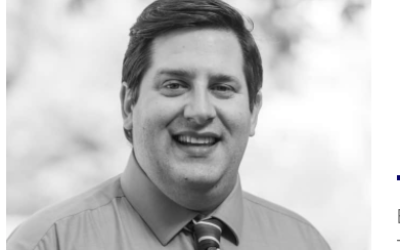
As the only candidate for the role of Treasurer, Ben Crowne also took up the chance to answer all of the same questions submitted to candidates.
Crowne stressed that alongside Cohen, as a deputy he had proposed the summer 2020 resolution that saw the Board finally commit to making its two-state solution commitment official policy.
A spokesperson for the group who submitted the questions told Jewish News:”This written Q&A is the first of its kind in these BoD elections to invite candidates to make commitments in writing to questions from Deputies. We highlighted issues which we felt merited some more discussion in the elections.
“The responses reveal how deeply candidates may have thought about tackling challenges that the Board faces, in greater detail than slogans, soundbites and hot air in a hustings.
“With the Presidential elections approaching next week, deputies can read and decide for themselves which candidate they feel have given answers which show they will take clear, realistic steps to succeed on these issues – from boosting youth recruitment and retention, to fully utilising the diverse knowledge and skills of Deputies.”
The 300 deputies cast their votes on the four candidates bidding to succeed Marie van der Zyl as president next Sunday.

Thank you for helping to make Jewish News the leading source of news and opinion for the UK Jewish community. Today we're asking for your invaluable help to continue putting our community first in everything we do.
For as little as £5 a month you can help sustain the vital work we do in celebrating and standing up for Jewish life in Britain.
Jewish News holds our community together and keeps us connected. Like a synagogue, it’s where people turn to feel part of something bigger. It also proudly shows the rest of Britain the vibrancy and rich culture of modern Jewish life.
You can make a quick and easy one-off or monthly contribution of £5, £10, £20 or any other sum you’re comfortable with.
100% of your donation will help us continue celebrating our community, in all its dynamic diversity...
Engaging
Being a community platform means so much more than producing a newspaper and website. One of our proudest roles is media partnering with our invaluable charities to amplify the outstanding work they do to help us all.
Celebrating
There’s no shortage of oys in the world but Jewish News takes every opportunity to celebrate the joys too, through projects like Night of Heroes, 40 Under 40 and other compelling countdowns that make the community kvell with pride.
Pioneering
In the first collaboration between media outlets from different faiths, Jewish News worked with British Muslim TV and Church Times to produce a list of young activists leading the way on interfaith understanding.
Campaigning
Royal Mail issued a stamp honouring Holocaust hero Sir Nicholas Winton after a Jewish News campaign attracted more than 100,000 backers. Jewish Newsalso produces special editions of the paper highlighting pressing issues including mental health and Holocaust remembrance.
Easy access
In an age when news is readily accessible, Jewish News provides high-quality content free online and offline, removing any financial barriers to connecting people.
Voice of our community to wider society
The Jewish News team regularly appears on TV, radio and on the pages of the national press to comment on stories about the Jewish community. Easy access to the paper on the streets of London also means Jewish News provides an invaluable window into the community for the country at large.
We hope you agree all this is worth preserving.

